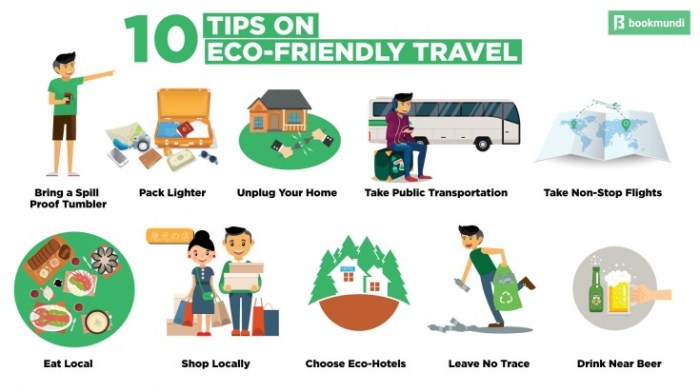Embark on an eco-conscious journey with our comprehensive guide to eco-friendly travel tips. Discover how to minimize your environmental impact while immersing yourself in the wonders of the world.
From choosing sustainable transportation options to packing responsibly and engaging in ethical travel practices, this guide empowers you to travel with a clear conscience and contribute to a greener future.
Sustainable Transportation Options: Eco-friendly Travel Tips
Eco-friendly travel involves making conscious choices about transportation to minimize carbon footprint and preserve the environment. Various sustainable modes of transportation exist, including trains, buses, and electric vehicles, offering alternatives to air travel and reducing greenhouse gas emissions.
For those seeking an adrenaline rush while minimizing their environmental impact, eco-friendly travel tips can guide your adventure. Consider extreme sports vacations that offer thrilling experiences while adhering to sustainable practices. These trips often involve activities like kayaking, rock climbing, and mountain biking, allowing you to explore natural landscapes responsibly and create lasting memories without compromising the environment.
Public Transportation
Public transportation systems, such as trains and buses, provide efficient and eco-friendly ways to travel. They reduce traffic congestion, air pollution, and greenhouse gas emissions by consolidating multiple passengers into a single vehicle.
Ride-Sharing and Carpooling
Ride-sharing and carpooling services allow individuals to share vehicles for commuting or long-distance travel. By reducing the number of cars on the road, these services minimize traffic congestion, pollution, and carbon emissions.
Electric Vehicles, Eco-friendly travel tips
Electric vehicles (EVs) run on electricity rather than fossil fuels, significantly reducing greenhouse gas emissions. EVs offer a sustainable alternative to traditional gasoline-powered vehicles and contribute to cleaner air quality.
Reducing Carbon Footprint While Flying
Air travel contributes to a significant portion of carbon emissions. To reduce the impact, consider the following tips:
- Choose non-stop flights to minimize fuel consumption.
- Pack light to reduce weight and fuel requirements.
- Offset carbon emissions through reputable programs.
Accommodation Choices

Choosing eco-friendly accommodations can significantly reduce your travel footprint. Sustainable hotels and guesthouses prioritize responsible practices, minimizing environmental impact while enhancing guest experiences.
Eco-friendly Amenities and Practices
Look for accommodations that offer:
– Energy-efficient appliances and lighting
– Water-saving fixtures and low-flow toilets
– Recycling and composting programs
– Organic and locally sourced food options
– Non-toxic cleaning products
– Green building materials and construction techniques
Examples of Sustainable Hotels
Several hotels demonstrate innovative sustainable tourism initiatives:
– Six Senses Resorts and Spas: Renowned for their commitment to sustainability, Six Senses properties feature eco-friendly villas, organic gardens, and conservation programs.
– Alila Hotels and Resorts: Alila properties emphasize energy efficiency, water conservation, and local community involvement.
– Mandarin Oriental, Hong Kong: This urban hotel has achieved LEED Gold certification for its sustainable practices, including a rainwater harvesting system and rooftop garden.
Responsible Packing and Travel Essentials
To minimize waste and environmental impact, it’s crucial to pack responsibly and choose eco-friendly travel essentials. Here are tips to help you achieve sustainable packing:
Tips for Packing Light and Reducing Waste:
- Plan your outfits in advance to avoid overpacking.
- Choose versatile items that can be mixed and matched.
- Utilize packing cubes to compress clothing and save space.
- Consider renting or borrowing items instead of buying new ones.
- Opt for reusable bags and containers instead of single-use plastics.
Eco-friendly Alternatives to Single-Use Plastics
Single-use plastics are a major contributor to waste. Here are eco-friendly alternatives to reduce their use:
- Bring a reusable water bottle and refill it at public water stations.
- Use reusable containers for snacks, sandwiches, and toiletries.
- Carry reusable utensils, straws, and shopping bags.
- Avoid plastic packaging by opting for bulk purchases and unpackaged produce.
- Support businesses that offer sustainable packaging options.
Eco-friendly Toiletries and Clothing
Conventional toiletries and clothing can contain harmful chemicals. Consider these eco-friendly alternatives:
- Use solid or bar toiletries instead of liquid ones to reduce plastic waste.
- Choose biodegradable and cruelty-free toiletries made with natural ingredients.
- Opt for sustainable clothing materials like organic cotton, bamboo, or recycled fabrics.
- Support fair trade and ethical fashion brands that prioritize environmental and social responsibility.
- Consider repairing or upcycling old clothing instead of discarding it.
Sustainable Travel Gear and Accessories
Invest in sustainable travel gear and accessories to enhance your eco-friendly journey:
- Choose luggage made from recycled or sustainable materials.
- Opt for travel accessories like backpacks, neck pillows, and eye masks made from eco-friendly fabrics.
- Consider solar-powered chargers to reduce reliance on disposable batteries.
- Use a reusable travel towel made from quick-drying and antibacterial materials.
- Bring a reusable coffee mug to avoid single-use cups.
Activities and Tours
Immerse yourself in sustainable experiences that support local communities and preserve natural environments. Seek activities that align with eco-friendly practices and responsible wildlife viewing.
Eco-friendly Activities and Tours
- Participate in community-based tourism initiatives that empower local residents and showcase their cultural heritage.
- Choose tours operated by responsible companies that prioritize environmental conservation and ethical wildlife encounters.
- Opt for walking, cycling, or kayaking excursions that minimize carbon emissions and allow for a closer connection with the natural surroundings.
Responsible Wildlife Viewing
Observe wildlife from a respectful distance, using binoculars or telephoto lenses to avoid disturbing their behavior.
- Avoid feeding or interacting with wild animals, as it can disrupt their natural feeding patterns and make them dependent on humans.
- Stay on designated trails and avoid disturbing wildlife habitats.
- Support organizations involved in wildlife conservation and anti-poaching efforts.
Sustainable Food Options and Local Markets
Explore local markets and restaurants that offer sustainable and locally sourced food.
- Choose dishes made with seasonal, organic ingredients to support local farmers and reduce food miles.
- Opt for vegetarian or vegan options to minimize the environmental impact of meat production.
- Bring your own reusable water bottle and containers to avoid single-use plastic waste.
Travel Planning and Research
Incorporating sustainability into your travel plans requires thoughtful research and planning. Start by exploring destinations that prioritize environmental conservation and community well-being.
To enjoy sustainable and responsible travel, opt for eco-friendly travel tips that prioritize reducing environmental impact. Consider offsetting carbon emissions, packing light, and choosing accommodations with green initiatives. For a luxurious twist, explore luxury travel tips that emphasize sustainable practices.
This can include staying in eco-conscious hotels, supporting local businesses, and engaging in ethical wildlife encounters. By embracing eco-friendly principles, you can enjoy both a luxurious and responsible travel experience.
Look for travel agencies and organizations that specialize in promoting eco-friendly tourism. They can provide valuable insights and connections to local businesses committed to sustainable practices.
Finding and Booking Eco-Friendly Flights and Accommodations
- Choose airlines with a strong track record of environmental stewardship, such as those with fuel-efficient aircraft and carbon offset programs.
- Opt for accommodations that are certified by recognized eco-labels, such as Green Globe, LEED, or EarthCheck. These certifications indicate that the properties meet specific sustainability criteria.
- Consider alternative transportation options, such as trains or buses, which generally have a lower carbon footprint than air travel.
Offsetting Carbon Emissions
Carbon offsetting is a way to reduce the environmental impact of your travels by investing in projects that reduce greenhouse gas emissions elsewhere. This can be done through organizations that offer carbon offset programs.
To calculate your carbon footprint, you can use online calculators provided by reputable organizations like the Carbon Trust or the Environmental Protection Agency (EPA). Once you have calculated your footprint, you can purchase carbon offsets to invest in projects that reduce emissions by an equivalent amount.
In the realm of eco-conscious travel, adopting sustainable practices extends beyond transportation and accommodation. When planning your itinerary, consider exploring sustainable travel destinations that prioritize environmental preservation and local community empowerment. By choosing destinations that actively implement eco-friendly policies, you not only minimize your impact but also contribute to the protection and prosperity of these regions.
Reputable Carbon Offset Programs
- Gold Standard
- Verified Carbon Standard (VCS)
- American Carbon Registry
- Climate Action Reserve
Responsible Travel Practices
Adopting ethical and respectful travel practices is essential for minimizing our environmental impact and preserving the integrity of destinations. It involves respecting local cultures and customs, supporting sustainable businesses, and minimizing environmental harm.
Respecting local cultures and customs is paramount. Learn about local traditions, dress codes, and social norms to avoid causing offense or misunderstanding. Engage with locals respectfully, and avoid patronizing or exploiting them.
Minimizing Environmental Impact
When exploring destinations, minimize environmental impact by:
- Choosing eco-friendly transportation options, such as walking, cycling, or using public transport.
- Conserving water and energy in accommodations by turning off lights and water when not in use.
- Reducing waste by bringing reusable items, avoiding single-use plastics, and properly disposing of trash.
- Respecting wildlife by observing them from a distance, not disturbing their habitats, and avoiding feeding them.
Resources and Case Studies
To further support your eco-friendly travel journey, consider the following resources and case studies:
Useful Resources
- Responsible Travel: A comprehensive website with tips, articles, and resources on sustainable tourism.
- Green Globe: A global certification program for sustainable tourism businesses.
- Lonely Planet: Offers a dedicated section on sustainable travel with guides and recommendations.
- World Wildlife Fund (WWF): Provides resources on wildlife conservation and sustainable travel practices.
Case Studies of Successful Eco-Friendly Tourism Initiatives
- Costa Rica: A leader in sustainable tourism, showcasing successful conservation efforts and eco-friendly practices.
- Iceland: Known for its geothermal energy and responsible tourism policies, preserving its pristine landscapes.
- Bhutan: Implements a “Gross National Happiness” index, prioritizing environmental sustainability and cultural preservation.
- Galápagos Islands: A UNESCO World Heritage Site, strictly regulating tourism to protect its unique biodiversity.
Inspiring Examples of Travelers Who Prioritize Sustainability
- Ben Southall: A British adventurer who promotes responsible travel through his blog and expeditions.
- Sarah Wilson: An Australian author and sustainability advocate who shares tips on eco-conscious travel.
- Jessica Nabongo: The first Black woman to travel to every country in the world, highlighting responsible tourism and cultural exchange.
- Zero Waste Chef Anne-Marie Bonneau: A Canadian chef who travels and educates about sustainable cooking and waste reduction.
Last Point

As you embrace eco-friendly travel, you not only reduce your carbon footprint but also support local communities and preserve the beauty of our planet for generations to come. Travel responsibly, explore sustainably, and create memories that are both meaningful and environmentally conscious.
Common Queries
What are some eco-friendly transportation options?
Consider trains, buses, electric vehicles, ride-sharing, and carpooling to minimize your carbon footprint during travel.
How can I find eco-friendly accommodations?
Look for hotels and guesthouses that prioritize sustainability, offer eco-friendly amenities, and demonstrate responsible tourism initiatives.
What are some tips for responsible packing?
Pack light, reduce waste by choosing reusable items, and opt for eco-friendly alternatives to single-use plastics, toiletries, and clothing.